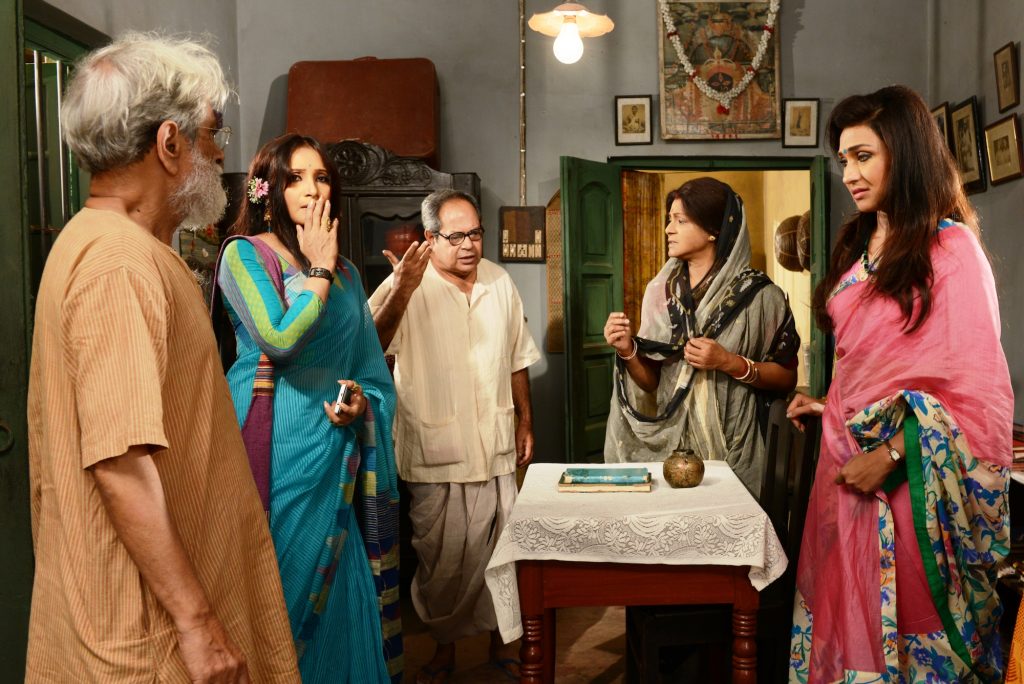Tarun Majumdar’s social message has always been quite low key never permitting the agenda to overshadow or spoil the narrative. But in this film, he puts in several such as the mills closing shop that renders hundreds unemployed, sexual harassment at the workplace, the casting couch where Ballari comes to audition for her music, and the insultingly derogatory attitude of the affluent towards the poor which really do not have much place in the story.
Bhalobashar Bari is about a lower middle-class Bengali family who live in Konnagar, a suburban town a little distance away from Kolkata. The head of the family Bhabotosh (Dwijen Banerjee) works in a jute mill which is on the verge of closing down because plastic bags have made jute bags redundant and soon after, his mill too, pulls down its shutters. He, along with his long-time colleague, Janardhan (Bibhas Chakraborty), a refugee from Bangladesh who is given shelter in his home, start a small shop while the elder of his two daughters Ballari (Rituparna Sengupta) begins a music class in their rented home to make both ends meet. However, one never gets to see a single scene or a minor reference to this “small business” right through the film. A few local hooligans try to harass Ballari but she is strong enough to counter the advances of their leader. How Ballari gets a job in a travelling agency, falls in love with a young colleague Kalyan Sinha (Pratik Sen) and what happens in between till it ends where it begins – with the wedding of Ballari and her office colleague, makes for the rest of the film.
This film as Majumdar’s recent films Alo and Bhalobashar Anek Naam prove, lacks the magic touch his entire range of films can still boast of. They still carry his unfailing signature of a good story, melodiously rendered Tagore songs and wholesome family entertainment. But as the film proceeds from the beginning, one can sense an overload of sentimental melodrama that reeks strongly of sugar syrup with lots of glycerine thrown in. In short, the film looks terribly outdated in terms of plot and theme and the picnic scene lacks credibility.
The editing leaves much room for improvement. The cinematography is okay considering the ambience the film demands and the music is beautiful, since every single song is a Tagore creation. The acting by some of the cast runs away with the honours and topping this list are the late Dwijen Banerjee as Bhabatosh and Rituparna Sengupta as Ballari. Of the rest, Pratik, who is an import from television soaps, appears somewhat uncomfortable in some scenes and self-conscious in others. The actress who plays Ballari’s friend overacts to the hilt. Sreela Majumdar as Bhabatosh’s wife has little to contribute except wear a tearful expression right through the film and her make-up is an eyesore to say the least. Veteran actress Gita Sen too, is reduced to a glycerine factory. Rituparna’s saris seem to have been drawn from a fashion designer’s wardrobe and she hardly repeats a sari in the film which makes one wonder about the financial status of the family. The love angle remains as low-key as Bengali cinema was in the 1950s and 1960s and is not developed at all. The characterisations are so sharply drawn that grey shades are wiped out completely. Even Debdoot Ghosh is etched out with too much villainy.
Majumdar has often gone into professional self-seclusion in the recent past and is not quite in touch with recent trends in Bengali cinema. All the same, for senior citizens and believers in conventional thinking, Bhalobashar Bari will strike a chord of nostalgia somewhere and that is what sets it apart from the general fare dished out in the name of good cinema.
Bengali, Drama, Color
https://www.youtube.com/watch?v=sqVse2iWOE8



i watched this movie in youtube and i liked it.
Reactions to any film are extremely subjective. They differ from person to person.